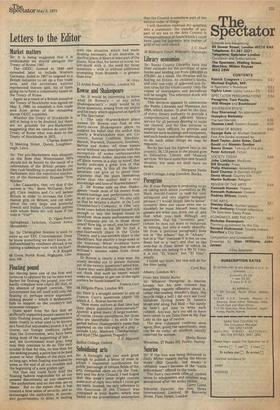Rowse and Shakespeare
Sir: It would be interesting to know what Dr Rowse's — or any other Shakespearian's — reply would be to these questions, arising from my article and his reply which appeared on April 19 in The Spectator: 1. The only Warwickshire place names Dr Rowse can find in the thirty-seven Shakespeare plays, to support his belief that the author was clearly a Warwickshire man, are: Coventry, Sutton Coldfield, Hinckley, Barson, Warwick, Dunsmore, Southam, Barton and Arden. All these names occur without any description, with the exception of some unfavourable remarks about Arden. Anyone can reel off place names in a play or novel; that hardly indicates a great love of that particular area. Is this all the Shakespearians can give us to prove their argument that the plays themselves show that the author had a real knowledge and love of Warwickshire?
2. Dr Rowse tells us that Shakespeare "made most of his money from theatre-takings and performances, not as an actor or dramatist." He also tells us that he became a sharer, in the Lord Chamberlain's Company, in 1594, only three years before he found himself rich enough to buy the largest house in Stratford. How many performances did the Company put on in those three years? How big, or small, was his share? At some time in his life he had a one-fourteenth share in the Globe Theatre, and a one-seventh share in the Blackfriars. Not exactly a large stake in the business. What evidence have Shakespearians for saying that most of William's income came from these sources?
Dr Rowse is clearly a wise man. He wisely decided not to answer thirteen out of the twenty questions I asked him. I knew they were difficult ones, but I did not think that such an expert would make no attempt to get out of the tight corners he found himself in.
Francis Carr 34 Hillgate Place, London W8 Sir: Here is a straight answer to one of Francis Carr's questions (April 19) which A. L. Rowse leaves out.
"How many authors at that time had their plays published anonymously?" Answer: a great many, A large number, of course, remain anonymous, but those who are identifiable — to stick to the period before Shakespeare's name first appeared on the title-page of a play — include Lyly, Marlowe (Tamburlaine), and Kyd (The Spanish Tragedy).
J. C. Maxwell Balliol College, Oxford


































 Previous page
Previous page